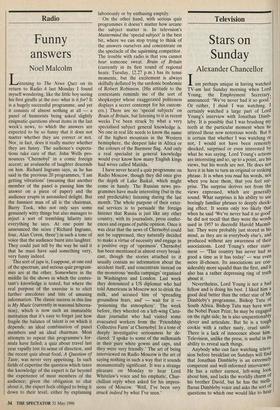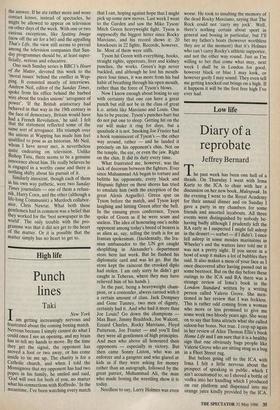Television
Stars on Sunday
Alexander Chancellor
Iam perhaps unique in having watched TV-am last Sunday morning when Lord Young, the Employment Secretary, announced: 'We've never had it so good.' Or rather, I think I was watching. I certainly watched a large part of Lord Young's interview with Jonathan Dimb- leby. It is possible that I was brushing my teeth at the particular moment when he uttered those now notorious words. But it is certain that whether I was watching or not, I would not have been remotely shocked, surprised or even interested by what he was saying. Lord Young's actions are interesting and so, up to a point, are his views, but his words are not. He does not have it in him to turn an original or striking phrase. It is when you read his words, not when you hear them, that you feel sur- prise. The surprise derives not from the views expressed, which are generally sound. What surprises is his ability to use boringly familiar phrases to deeply shock- ing effect. It seems only too likely that when he said 'We've never had it so good' he did not recall that they were the words used in 1957 to discredit Harold Macmil- lan. They were probably just stored in his mind, as they are in everybody else's, and produced without any awareness of their associations. Lord Young's other state- ment — 'This country has never had as good a time as it has today' — was even more ill-chosen. Its associations are con- siderably more squalid than the first, and it also has a rather depressing ring of truth about it.
Nevertheless, Lord Young is not a bad fellow and is doing his best. I liked him a good deal better than the other star of Mr Dimbleby's programme, Bishop Tutu of South Africa. Bishop Tutu may have won the Nobel Peace Prize; he may be engaged on the right side; he is also unquestionably clever and articulate. But he is a tough cookie with a rather nasty, cruel smile. There is a lack of innocence about him- Television, unlike the press, is useful in its ability to reveal such things. Anybody who can face watching televi- sion before breakfast on Sundays will find that Jonathan Dimbleby is an extremely competent and well-informed interviewer- He has a rather earnest, left-wing look about him, and lacks the worldly charm of his brother David, but he has the melli- fluous Dimbleby voice and asks the sort Of questions to which one would like to hear the answer. If he ate rather more and wore contact lenses, instead of spectacles, he might be allowed to appear on television on other days of the week. With one or two curious exceptions, like Spitting Image (now off the air for a bit) and the appalling That's Life, the view still seems to prevail among the television companies that Sun- day programmes should be, at least super- ficially, serious and educative.
One such Sunday series is BBC1's Heart of the Matter, devoted this week to the `moral issues' behind the conflict in Wap- ping. It consisted mostly of interviews. Andrew Neil, editor of the Sunday Times, spoke from his office behind the barbed wire about the trades unions' arrogance of power'. 'If the British aristocracy had behaved in that way in the 19th century in the face of democracy, Britain would have had a French Revolution,' he said. I felt that the statement reflected some of the same sort of arrogance. His triumph over the unions at Wapping has made him feel qualified to pose as an historian. Mr Neil, whom I have never met, is nevertheless quite endearing on television. Unlike Bishop Tutu, there seems to be a genuine innocence about him. He really believes he Is engaged in a worthy cause and there is nothing shifty about his pursuit of it. Similarly innocent, though each of them in his own way pathetic, were two Sunday Times journalists — one of them a refuse- ink, Harry Coen, and the other (although a life-long Communist) a Murdoch collabor- ator, Chris Nawrat. What both these gentlemen had in common was a belief that they worked for the 'best newspaper in the world'. The only trouble with the pro- gramme was that it did not get to the heart of the matter. Or it is possible that the matter simply has no heart to get to.



























































 Previous page
Previous page